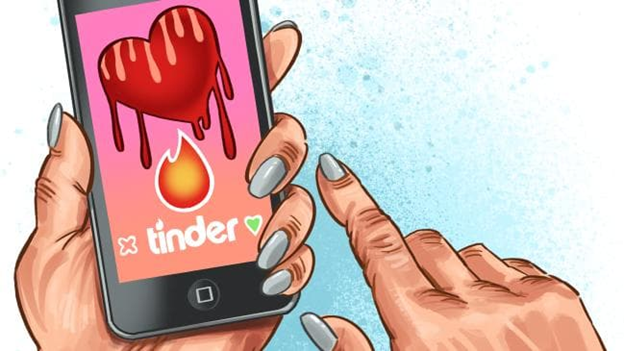h2>Dating : Swipe For Your Rights
Feminism and dating apps
From corsets and courtship to right swipes and eggplant emojis🍆. It’s undeniable that the way we form relationships has evolved dramatically over the last 100 years. With over 50 million active users on Tinder alone, dating apps are at the forefront of this change. Even with such widespread use and prevalence, dating apps have been met with heavy criticism. Phenomena such as ghosting, breadcrumbing and online harassment are all fueled by the online dating scene. That being said, I argue that these digital technologies can have a brighter perhaps feminist side, and might be able to facilitate women’s dating lives.
Most dating apps follow a simple yet effective formula in which users are offered potential matches based on location. For a match to occur both users need to ‘swipe right’ to approve of each other, whereas a ‘swipe left’ rejects the match. This process is based on photographs and written profiles. Cue the ‘just here for a good time not a long time’ and “my dogs cuter than yours”. With a few small swipes the two profiles are connected and able to message. This kind of digital technology contributes affordances of; mobility, proximity, immediacy, and visual dominance. Thus allowing users to have an ‘easy’ dating experience in the modern world, Tinder, according to its founders was designed specifically to take the stress out of dating.
Personally, as a stressed out millennial girl, that is exactly what I needed. After an onslaught of horrific dates about 4 months ago I’d decided I had enough. I was sick of waiting for guys who I didn’t particularly like to approach me first whether that be in real life or online. For the first time I was motivated to take charge. I wanted to choose and mostly I wanted to be the instigator. So swiping through Tinder I found myself what I considered a match. He ticked all my boxes, mostly being lack of overposed shirtless selfies, shared music taste (thanks Spotify partnership) and a simple but thoughtful bio. I messaged him first, I asked him on a date and I made all the first moves. No longer was I merely just responding or reacting to men in my life, I was actively making my own decisions. My inner feminist gave me a light pat on the back. You could argue that this could have been easily replicated without technology, but I think it was the ease and affordances of these dating platforms that facilitated this experience for me.
If we look historically, this technology provides stress-free approach to dating that was never before present. Previously match making relied heavily upon friends, family members and even chance meetings. Critics of dating apps such as sociologist Zygmunt Bauman like to push forward the idea that dating apps are unravelling relationships all together. But if we look closer at the history of dating and courtship has it ever really been that great for women anyway? Dating itself is a relatively new concept, and only became commonplace in western countries at the turn of the 20th century. Prior to this courtship was an unemotional affair based on finances and social class. Women were often completely passive in these processes and confined to typical gender roles. Traditional dating ideals according to UK Professor of Social Psychology Viren Swami “thwart women’s ability to express themselves, as it requires a relinquishing of control and agency.” So maybe relationships are merely reflecting the societal shift and changes of relationships in general (but that’s another debate altogether).
So is Tinder a feminist dream? Can we all rejoice in these digital technologies? Well, not quite. Although these apps have the potential to facilitate women’s lives which is a core component in considering feminist technologies. They however do not automatically ensure this experience. Talk show host and podcaster Flex Mami explores the notion of feminism and dating with agency. Flex puts forward the idea that apps like tinder are not inherently feminist if they are used without intention; “You girls think you’re dating with intention. But haven’t started one conversation, but haven’t initiated one single date. No, you are not dating, you are loitering around men waiting for someone to pick you.”



